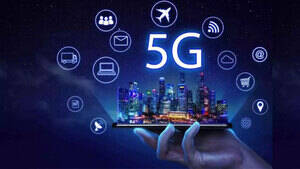Exploring the 5G technology and impacts on Society
5G Technology is set to deliver unprecedented speed and bandwidth, with peak data rates projected to reach 20 Gbps.

In an era marked by unprecedented technological advancement, the emergence of 5G technology stands out as a monumental milestone.
As the fifth generation of wireless technology, 5G promises to reshape the way we connect, communicate, and interact with the world around us. This blog post aims to provide a comprehensive understanding of the concept of 5G technology and its potential impact on society.
Understanding the 5G Technology
Before we delve into its societal impact, let's first grasp the fundamentals of 5G technology. At its core, 5G represents the fifth generation of mobile networks, succeeding 4G.
While previous generations focused primarily on enhancing connectivity and data speed, 5G aims to offer much more. Here are some key features and aspects of 5G technology:
Speed and Bandwidth: 5G is set to deliver unprecedented speed and bandwidth, with peak data rates projected to reach 20 Gbps. This is significantly faster than 4G, which averages around 100 Mbps. This immense speed will enable quick downloads, seamless streaming, and real-time data transmission.
Low Latency: One of the most remarkable features of 5G is its incredibly low latency. Latency refers to the delay between sending a request and receiving a response.
Network Slicing: 5G introduces network slicing, allowing network operators to allocate specific portions of the network to different applications.
Enhanced Security: With the proliferation of IoT devices, security becomes a paramount concern. 5G incorporates advanced security features to protect data and devices from potential threats.
The Potential Impact on Society by 5G Technology
Now that we have a grasp of what 5G technology entails, let's explore how it is poised to impact society across various domains.
Telecommunications and Connectivity:The most immediate and tangible impact of 5G will be on telecommunications and connectivity. Faster download and upload speeds will revolutionize the way we consume media, stream content, and communicate. Video calls will be clearer and more seamless, while online gaming will experience a new level of real-time interaction.
Healthcare:The healthcare industry stands to benefit immensely from 5G technology. With low latency and high bandwidth, remote surgeries and telemedicine will become more accessible and reliable. Doctors can perform surgeries from thousands of miles away with near-instantaneous response times, potentially saving lives in critical situations.
Autonomous Vehicles:Self-driving cars have been on the horizon for some time, and 5G is a significant step towards their widespread adoption.
Smart Cities:5G plays a pivotal role in the development of smart cities. From traffic management to energy efficiency, smart city solutions rely on real-time data processing, which 5G networks can provide. This can lead to reduced traffic congestion, optimized resource allocation, and enhanced urban planning.
Education:The COVID-19 pandemic accelerated the adoption of online learning. With 5G, students will have access to high-quality, real-time virtual classrooms, making education more inclusive and flexible. Virtual and augmented reality can also revolutionize the way students learn and interact with educational content.
Entertainment and Gaming:The entertainment industry is poised for a transformation with 5G. Augmented reality (AR) and virtual reality (VR) experiences will become more immersive and accessible. Online gaming will reach new heights with low-latency, lag-free gameplay, and cloud gaming services.
IoT and Smart Devices:The Internet of Things (IoT) will flourish under 5G. Everything from smart home devices to industrial sensors will benefit from the massive connectivity and energy efficiency offered by 5G networks. This will lead to increased automation, improved resource management, and enhanced quality of life.
Environmental Impact:While not immediately obvious, 5G can have a positive impact on the environment. Its energy efficiency can lead to reduced energy consumption in data centers and network infrastructure. Additionally, smart city solutions enabled by 5G can help optimize resource utilization and reduce waste.
Challenges and Considerations
Despite its immense potential, the rollout of 5G technology also comes with challenges and considerations. These include:
Infrastructure Investment:The deployment of 5G networks requires a substantial investment in infrastructure, including the installation of small cell towers and fiber-optic cables. This can be a significant financial burden for network operators and governments.
Privacy and Security:With the increased connectivity of IoT devices, concerns about data privacy and security become more pressing. Safeguarding sensitive information and protecting against cyber threats will be paramount.
Ensuring equitable access to 5G technology is essential to avoid exacerbating the digital divide. Extensive research is ongoing to address these concerns and ensure the safety of 5G technology.
In conclusion, 5G technology represents a monumental leap forward in the realm of connectivity and communication. Its potential to reshape various aspects of society, from healthcare and education to transportation and entertainment, is truly remarkable.
As 5G continues to roll out and evolve, it will undoubtedly leave an indelible mark on the way we live, work, and interact with the world around us.
Embracing this technology responsibly and inclusively will be key to harnessing its full potential for the betterment of society.
What's Your Reaction?
















